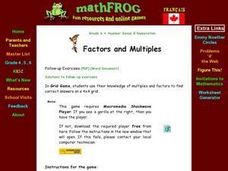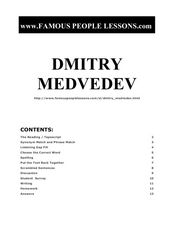Curated OER
Catcher in the Rye: Chapters 18-20 Venn Diagram
Well into Catcher in the Rye, when things are looking bleak and your readers may be needing some levity, read the picture book The Perfect Square by Michael Hall. Then use the Venn diagram included to compare how Holden Caulfield and the...
Alabama Learning Exchange
The Sun and the Earth
Third graders study and diagram the positions of the Earth and sun during the four seasons. They predict weather for cities in the northern and southern hemispheres.
Curated OER
Breaking News English: Iran's Ambassador Change
For this Iran's Ambassador change worksheet, students read the article, answer true and false questions, complete synonym matching, complete phrase matching, complete a gap fill, answer short answer questions, answer discussion...
Curated OER
Literature: Watching Anna
Students view the PBS presentation of Leo Tolstoy's, "Anna Karenina." Prior and after each episode, they discuss plot and characterization and in one lesson, use adjectives to describe each of the main characters. Then, students create...
Curated OER
High Profiles
Students research and write newspaper articles about current world leaders, using a New York Times International article as a model. They research a current world leader's personal background and political history.
Curated OER
Thomas Jefferson on the Sedition Act
Young scholars research and cite arguments Jefferson used in objecting to the Sedition Act. They discuss Jefferson's opinion on how constitutional questions about the Sedition Act could be resolved.
National Endowment for the Humanities
Lesson 2: The Debate in Congress on the Sedition Act
Pupils research and discuss the provisions in the Constitution that supported the arguments for and against the Sedition Act. They articulate objections to and arguments in favor of the Sedition Act.
Curated OER
From the President's Lips: The Concerns that Led to the Sedition (and Alien) Act
High schoolers research and briefly summarize the international situation during John Adams's presidency. They list the concerns that led to the Sedition Act and describe it.
Curated OER
Negotiate Peace for India and Pakistan
Students prepare for a fake peace talk between India and Pakistan.
Curated OER
This Land Is… Whose Land?
Students examine the territorial issues and perspectives surrounding the Israeli-Palestinian conflict. They create an outline and point-counterpoint essay illustrating the perspectives surround the Israeli land dispute with the...
Scholastic
Wrapping Up the School Year
Students complete a variety of writing and yearbook activities to complete the school year. They write a letter to the student that will sit in their desk the next school year, and a letter to their next year's teacher. As a culminating...
Curated OER
Israeli-Palestinian Peace Summit
Students examine the Israeli-Palestinian Peace Summit. In groups, they use the internet to research world leaders and discuss the peace process. To end the lesson, they present their findings along with issues that committees discuss...
Curated OER
Where in the Latitude Are You? A Longitude Here.
Students distinguish between latitude and longitude on the map. In this mapping lesson, students participate in mapping skills to recognize spatial relationships, and where to find natural resources on the map. Students create their own...
Curated OER
Tearing a Piece of Paper in Half
In this secondary mathematics activity, students investigate exponential growth as they predict the height of a stack of paper formed by tearing one sheet of paper in half over and over again for thirty tears. The one page activity...
Curated OER
Breaking News English: Iran
In this Iran worksheet, learners read the article, answer true and false questions, complete synonym matching, complete phrase matching, complete a gap fill, answer short answer questions, answer discussion questions, write, and more...
Curated OER
Integrate Algebra Regents Exam Bimodal Questions Worksheet #1
In this Integrated Algebra worksheet, students solve problems that reflect the topics covered during the course of work. The answer key identifies each question by standard and topic. The twenty-four page worksheet contains two...
Curated OER
The Cold War (1945–1963)
For this online interactive history worksheet, students respond to 8 short answer and essay questions about the Cold War. Students may check some of their answers on the interactive worksheet.
Curated OER
Factors and Multiples
Sixth graders need to see the relevance in the mathematics they learn. This lesson builds on the concepts of least common multiple and greatest common factor. The lesson presents real-world problem situations for students to solve.
Curated OER
Helen Clark
For this famous people worksheet, students read about the life of Helen Clark and complete a variety of comprehension activities including but not limited to matching, sequencing, writing and spelling activities. An answer key is included.
Curated OER
Coup-Operation in Pakistan
Learners, using a New York Times Article as a springboard for discussion, investigate the 1999 military coup in Pakistan. They generate further questions and research their answers.
Curated OER
Lesson Plan on Latitude and Longitude
Sixth graders identify at least ten places on the world map using given longitude and latitude points. They identify the longitude and latitude of ten places on the world map.
Curated OER
Dmitry Medvedev
In this famous person worksheet, students read a passage about Dmitry Medvedev and then complete a variety of in-class and homework activities to support comprehension, including partner interviews, spelling, cloze, synonym matches, and...
Curated OER
War and International Law:America’s Foreign Policy: A Brief History
Pupils discover the history of American foreign policy. In this foreign policy lesson, students listen to their instructor present a lecture that presents a brief history of American foreign policy. Pupils respond to discussion questions...
Curated OER
What Time Is It? (Latitude and Longitude)
Students practice latitude and longitude by identifying locations by degrees, use meanings of a.m. and p.m. appropriately, become familiar with 24-hour (universal) clock, and calculate time at different degrees longitude.

























